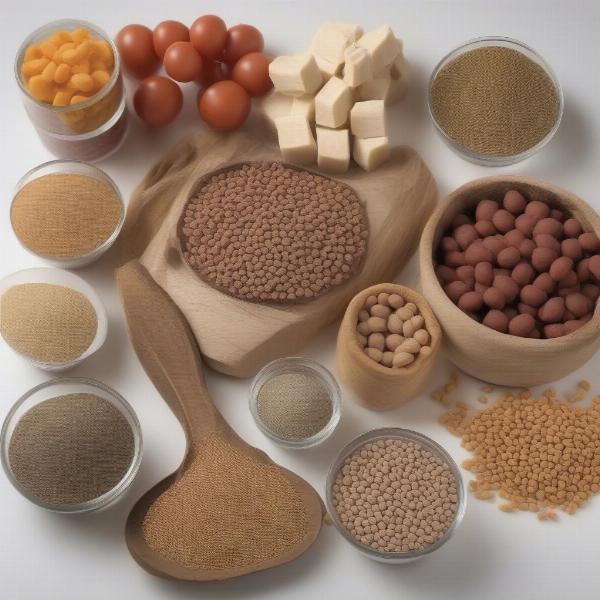Hepatic food for dogs plays a vital role in managing liver disease and supporting overall health. Choosing the right hepatic diet can be challenging, but understanding its importance and key features can help you make informed decisions for your furry friend. This comprehensive guide explores everything you need to know about hepatic dog food, from its benefits and ingredients to selecting the right brand and monitoring your dog’s progress.
Understanding Hepatic Disease in Dogs
Hepatic disease refers to a range of conditions affecting the liver, a crucial organ responsible for numerous functions, including filtering toxins, producing bile, and metabolizing nutrients. When the liver is compromised, it can’t perform these tasks efficiently, leading to various health issues. Hepatic diets are specifically formulated to support liver function and alleviate the strain on this vital organ.
Why Hepatic Food is Important
A specially formulated hepatic diet can significantly improve a dog’s quality of life when dealing with liver disease. These diets are typically lower in protein, sodium, and copper, while being higher in easily digestible carbohydrates and essential fatty acids. These adjustments help minimize the workload on the liver, reduce the buildup of toxins, and provide essential nutrients for overall well-being. hepatic dog food offers a unique balance of nutrients that helps support liver function and overall health.
Key Ingredients in Hepatic Dog Food
 Ingredients in hepatic dog food
Ingredients in hepatic dog food
- Reduced Protein: Lower protein levels help minimize the production of ammonia, a byproduct of protein metabolism that can be harmful to a compromised liver.
- Restricted Copper: Copper can accumulate in the liver of dogs with certain liver diseases. Hepatic diets control copper levels to prevent further damage.
- Increased Zinc: Zinc can help bind excess copper and promote its excretion from the body.
- Highly Digestible Carbohydrates: These provide readily available energy without stressing the liver.
- Essential Fatty Acids: These support cell function and reduce inflammation.
Choosing the Right Hepatic Food for Your Dog
Selecting the right hepatic food should always be done in consultation with your veterinarian. They can assess your dog’s specific condition and recommend a diet that meets their individual needs. Factors to consider include the severity of the liver disease, the dog’s age and breed, and any other underlying health conditions. dog hepatic diets are tailored to support dogs with liver conditions.
Monitoring Your Dog’s Progress
Once your dog is on a hepatic diet, regular monitoring is crucial. Observe for any changes in appetite, weight, energy levels, and overall demeanor. Regular blood tests can also help track liver enzyme levels and assess the effectiveness of the diet. hepatic food for dogs requires careful monitoring and adjustments based on the dog’s response.
Conclusion
Hepatic food for dogs is a vital component of managing liver disease. By understanding the importance of a balanced, low-protein, copper-restricted diet, and working closely with your veterinarian, you can provide your dog with the best possible support and improve their overall quality of life. Don’t hesitate to discuss any concerns with your vet and ensure regular monitoring for optimal results. cholestatic disease in dogs can also benefit from a specialized diet.
FAQ
- What are the signs of liver disease in dogs? Common signs include jaundice, lethargy, vomiting, diarrhea, and increased thirst.
- Can hepatic food cure liver disease? While hepatic food cannot cure liver disease, it can significantly manage symptoms and slow progression.
- How long will my dog need to be on hepatic food? The duration depends on the specific condition and your veterinarian’s recommendation. It could range from a few months to lifelong.
- Are there any side effects of hepatic food? Some dogs may experience mild digestive upset initially, but this usually resolves quickly.
- Can I give my dog treats while they are on a hepatic diet? Consult your veterinarian before giving any treats, as they need to be compatible with the hepatic diet.
- What if my dog refuses to eat hepatic food? Try transitioning gradually or warming the food slightly to enhance palatability. You can also consult your vet for alternative options.
- Is hepatic food expensive? Hepatic food tends to be more specialized and therefore can be more expensive than regular dog food.
ILM Dog is a leading international pet website dedicated to providing expert advice on all aspects of dog care and well-being. We offer resources and guidance on breeds, health, training, nutrition, grooming, and much more. Our team of experts is committed to providing you with reliable, practical information to help you provide the best possible care for your canine companion. Whether you’re a new dog owner or a seasoned expert, ILM Dog is your trusted source for all things dog-related. Contact us at [email protected] or +44 20-3965-8624 for personalized guidance. Visit us at ILM Dog.